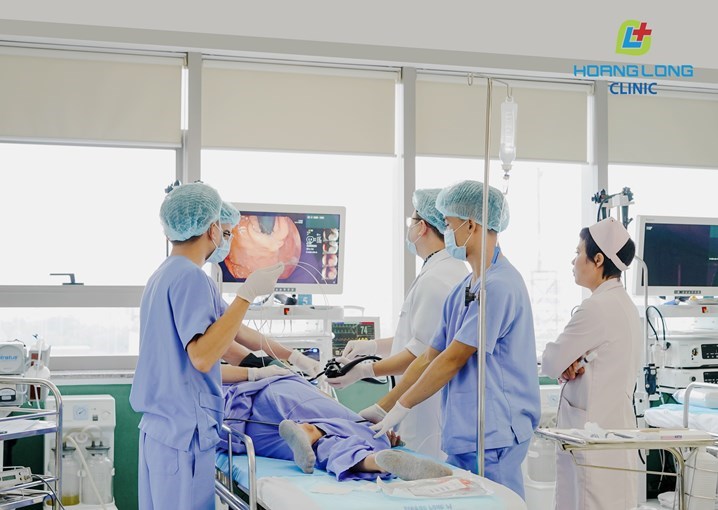The first time successfully removed the CARCINOID tumor for a 70-year-old man through endoscopy.
"Recently, I often have abdominal pain, nausea, and diarrhea, in addition to redness skin, blood vessels that appear on the skin like spider webs, purple in color ..." - sharing of Mr. N.V.T (70 years old - Hanoi).
Patient was examined and treated carcinoid tumor at Hoang Long Clinic
Before coming to Hoang Long Clinic, Mr. T had visited many big and small hospitals and was diagnosed with Carcinoid tumor in the digestive tract. This is a highly cancerous potential tumor. Therefore, the doctors prescribed surgery to remove this tumor. However, due to his advanced age, in addition to having other diseases such as high blood pressure, high cholesterol, etc., Mr. T and his family were also afraid to perform surgery because it would be dangerous and may affect health condition. After consultation, Mr. T decided to receive treatment at Hoang Long Clinic.

Photo: Abdominal pain in patient with Carcinoid Tumor
According to Professor Dao Van Long, PhD - Former Head of Gastroenterology Department of Bach Mai Hospital, Former Director of Hanoi Medical University Hospital, Senior Expert at Hoang Long Clinic: “Carcinoid tumors are neuroendocrine tumors and have a relatively high potential of malignancy. In the early stages, there is no typical symptom so it is difficult to diagnose carcinoid tumors. In many cases, carcinoid tumors are detected accidentally during regular physical examinations.”
Initially, when he visited Hoang Long Clinic, Mr. T was prescribed endoscopic ultrasound to determine the nature of the tumor, its location and invasion. Realizing that the tumor located close to the edge of the bauhin valve (the junction between the small intestine and the large intestine), in addition that the colonoscope is quite large, so it is extremely difficult to fix the snare to remove the tumor.
However, in this case, it is still possible to remove the tumor by flexible endoscopic technique without requiring surgical intervention. So the doctors performed a colonoscopy as usual. However, the endoscope is now replaced by gastroscopy (this endoscope has a smaller diameter) with a transparent plastic tube attached to the tip. With this change, endoscopy has become easier. Doctors fixed the tumor and thus completely removed the tumor from intestine. The patient could resume leisure activities as directed by the doctor.

Photo: Endoscopy procedure in Hoang Long Clinic
Professor Dao Van Long, PhD shared more about carcinoid tumors
Causes of carcinoid tumors
Currently, the exact cause of carcinoid tumors has not been found. Carcinoid tumors derived from cells of the neuroendocrine system, so they both secrete hormones and have nerve-like properties.
In the digestive system, neuroendocrine cells have the effect on regulating digestive juices release, controlling the movement of stomach and intestines, and controlling the growth of various celll types in digestive system. In lungs, neuroendocrine cells help control the flow of air and blood, and possibly the growth of other lung cells. Carcinoid tumors occur when these neuroendocrine cells mutate and overgrow. Firstly, carcinoid tumors are very small and develop slowly. It is not clear what makes the tumor grow faster and cause symptoms while in some cases the tumor remains small and has no symptoms.
“Although carcinoid tumors can appear at any age, it is more common in the elderly. Carcinoid tumors are also more common in women than men. If a parent has a carcinoid tumor, his child is more likely to get it. In addition, a family history of multiple endocrine neoplasia type 1 increases the risk of carcinoid tumors. Smoking might increases the risk of carcinoid tumors in lungs. Other medical conditions such as an inability to produce acid in the stomach, gastritis, or pernicious anemia... also increase the risk of gastrointestinal carcinoids.” Professor Dao Van Long, PhD shared.
Treatment for carcinoid tumors
Treatment for carcinoid tumors is similar to treatment for cancer and may also prescribe additional medications to control symptoms. Treatments may include:
-
Endoscopy: Carcinoid tumors can be removed by flexible endoscopic method, depending on size, nature of tumor as well as health condition of patient, an appropriate treatment regimen can be given.
-
Surgery: Remove a part or entire tumor depending on the specific case.
- Using medicine to inhibit tumor growth: Some medicine stimulate immune system to work more efficiently, others slow the growth of carcinoid tumors and relieve symptoms of the disease.
-
Blocking the blood supply of tumor spread to the liver: Intervention stops the blood supply of the metastasis tumor in the liver by occlusion of the hepatic artery. This procedure has some risks, so the doctor will have to discuss carefully with the patient.
-
Killing cancer cells spread to liver with heat or cold: Using high-frequency waves to destroy tumors with heat. The advantage of this technique is that it rarely causes serious complications, the rate of mild complications is about 2-3%. Cryotherapy is similar, but it works by freezing the tumor. These two techniques are generally safe, although there are risks of bleeding and infection.
-
Chemotherapy: Chemotherapy can shrink carcinoid tumor size. Side effects of chemotherapy depend on types of drugs.
Professor Dao Van Long, PhD also shared, “After removing carcinoid tumor, patient must have regular health check-ups in the first year to evaluate the effectiveness of treatment. Re-examination after the first 1 month and every 3 months after that, and the patient needs to strictly follow treatment regimen of the doctor.”
Watch the video below to learn more about the carcinoid tumor removal process at Hoang Long Clinic.
Contact information: Hoang Long Clinic
- Address: 10th floor, VCCI tower, 9 Dao Duy Anh, Dong Da, Hanoi.
- Hotline: 19008904| 024 628 11 331
- Zalo: 0986954448
- Fanpage: https://www.facebook.com/phongkhamdakhoahoanglong/
- Câu chuyện về một người lính Cụ Hồ gần nửa cuộc đời chiến đấu với viêm loét dạ dày
- Chữa bệnh dạ dày bằng thuốc lá ai ngờ không khỏi lại dính luôn cả bệnh gan
- Điều trị trĩ mãi không đỡ, hóa ra là polyp rất lớn ở trực tràng
- I did not think I had diverticulitis and had such a severe infection
- Cảnh giác với cơn đau bụng – bởi không phải cơn đau nào cũng là đau dạ dày